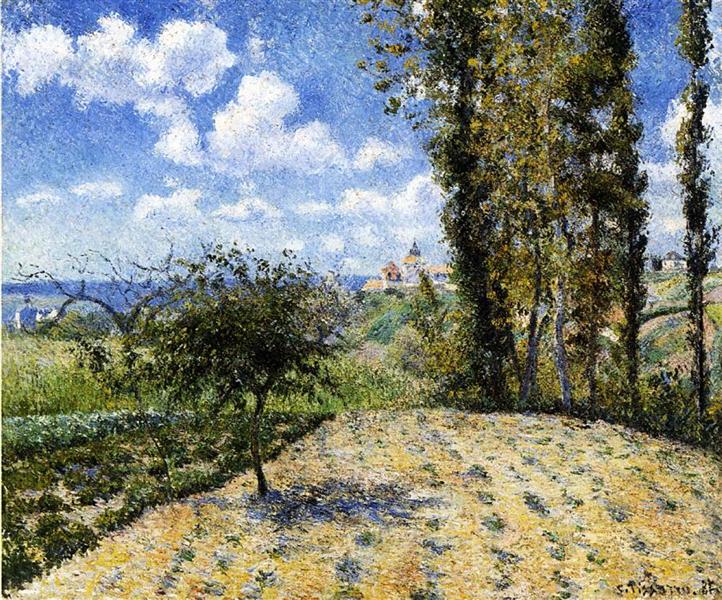Tanım
Camille Pissarro's "View Towards the Prison of Pontoise - In Spring", painted in 1881, is a fascinating depiction of the French landscape through the lens of Impressionism, an artistic movement that Pissarro himself helped define. The work captures a view of the Pontoise prison in the background, immediately revealing the relationship between nature and human construction, a theme that Pissarro explored throughout his career.
The composition is structured in a balanced way, with the prison emerging from the centre of the painting, surrounded by a vibrant spring landscape. The use of perspective is evident in the arrangement of the trees and fields, which lead the eye towards the imposing building. The sky, painted in soft shades of blue and white, evokes the freshness of spring and contrasts with the solidity of the prison. This play of light and shadow is a characteristic feature of Pissarro's style, who was concerned with capturing the fleeting effects of light on the landscape.
The colour palette is rich and varied, with greens and yellows predominating, suggesting the lush vegetation of the season. Warm tones contrast with the greyish structure of the prison, which not only highlights the building but also echoes the life that teems in the natural surroundings. This treatment of colour, where vibrant hues exist in harmony, is a testament to the Impressionist technique, which sought to capture a momentary impression rather than a comprehensive representation.
As for the lack of human characters in the work, this decision can be interpreted as a way of highlighting the isolation of the prison, as well as the immensity of the landscape that surrounds it. In doing so, Pissarro seems to emphasize the dichotomy between life that occurs in freedom and the confinement that the prison represents. The lack of human figures does not detract from the emotion of the work; rather, it invites the viewer to contemplate the interaction between the natural and the built, suggesting a silent meditation on the social conditions of the time.
Camille Pissarro, considered one of the fathers of Impressionism, always showed a particular interest in fusing everyday life with the more poetic aspects of nature. Throughout his career, he was prolific in depicting both rural and urban landscapes, and "View Towards the Prison of Pontoise - In Spring" is an eloquent example of his distinctive style. The work reflects his desire to capture both the essence of a specific place and the emotion invoked by seasonal change.
It is interesting to note that, despite his classicism, Pissarro never limited himself to the traditional depiction of landscape. His experimentation with the loose brushstroke technique and his preference for the momentary capture of colour and light anticipated the development of later movements in modern art. "View Towards the Prison at Pontoise" is not only a work that evokes the peace of a spring morning; it is also a testimony to a specific time and place, as well as an expression of the aesthetic evolution that represented Pissarro's admiration for nature, transforming it within the context of the contemporary landscape.
KUADROS ©, a famous painting on your wall.
Hand-made oil painting reproductions, with the quality of professional artists and the distinctive seal of KUADROS ©.
Painting reproduction service with satisfaction guarantee. If you are not completely satisfied with the replica of your painting, we will refund 100% of your money.

